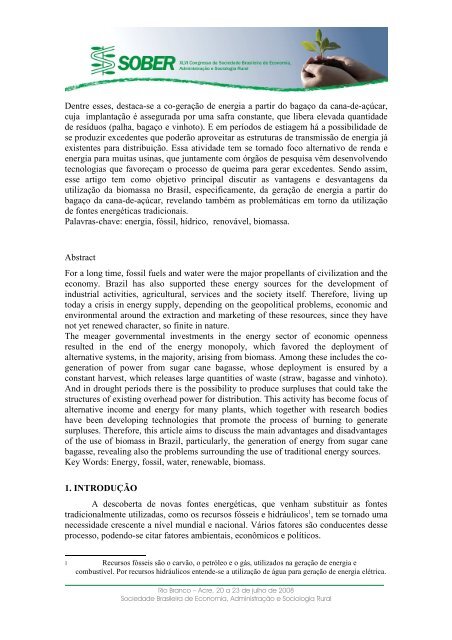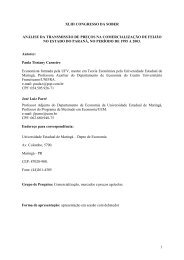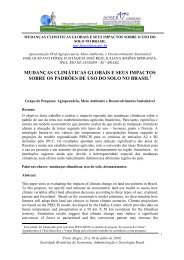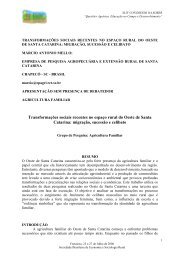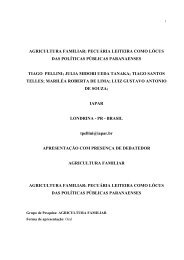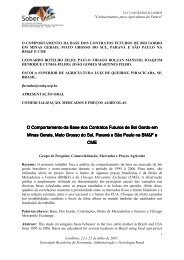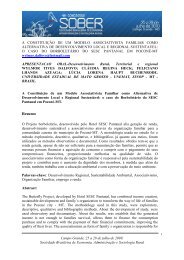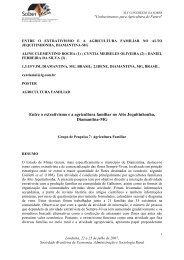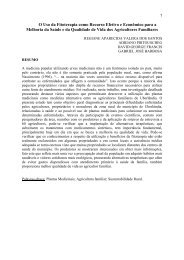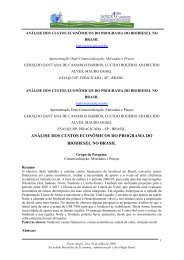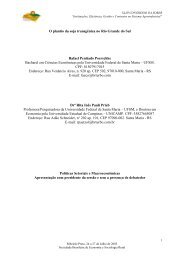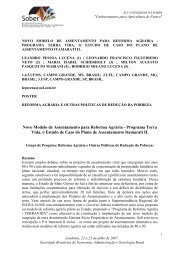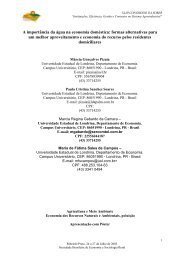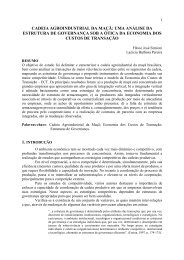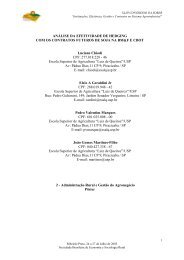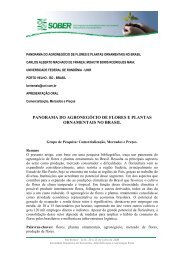Alternativas para a geração de energia renovável no ... - SOBER
Alternativas para a geração de energia renovável no ... - SOBER
Alternativas para a geração de energia renovável no ... - SOBER
You also want an ePaper? Increase the reach of your titles
YUMPU automatically turns print PDFs into web optimized ePapers that Google loves.
Dentre esses, <strong>de</strong>staca-se a co-<strong>geração</strong> <strong>de</strong> <strong>energia</strong> a partir do bagaço da cana-<strong>de</strong>-açúcar,<br />
cuja implantação é assegurada por uma safra constante, que libera elevada quantida<strong>de</strong><br />
<strong>de</strong> resíduos (palha, bagaço e vinhoto). E em períodos <strong>de</strong> estiagem há a possibilida<strong>de</strong> <strong>de</strong><br />
se produzir exce<strong>de</strong>ntes que po<strong>de</strong>rão aproveitar as estruturas <strong>de</strong> transmissão <strong>de</strong> <strong>energia</strong> já<br />
existentes <strong>para</strong> distribuição. Essa ativida<strong>de</strong> tem se tornado foco alternativo <strong>de</strong> renda e<br />
<strong>energia</strong> <strong>para</strong> muitas usinas, que juntamente com órgãos <strong>de</strong> pesquisa vêm <strong>de</strong>senvolvendo<br />
tec<strong>no</strong>logias que favoreçam o processo <strong>de</strong> queima <strong>para</strong> gerar exce<strong>de</strong>ntes. Sendo assim,<br />
esse artigo tem como objetivo principal discutir as vantagens e <strong>de</strong>svantagens da<br />
utilização da biomassa <strong>no</strong> Brasil, especificamente, da <strong>geração</strong> <strong>de</strong> <strong>energia</strong> a partir do<br />
bagaço da cana-<strong>de</strong>-açúcar, revelando também as problemáticas em tor<strong>no</strong> da utilização<br />
<strong>de</strong> fontes energéticas tradicionais.<br />
Palavras-chave: <strong>energia</strong>, fóssil, hídrico, <strong>re<strong>no</strong>vável</strong>, biomassa.<br />
Abstract<br />
For a long time, fossil fuels and water were the major propellants of civilization and the<br />
eco<strong>no</strong>my. Brazil has also supported these energy sources for the <strong>de</strong>velopment of<br />
industrial activities, agricultural, services and the society itself. Therefore, living up<br />
today a crisis in energy supply, <strong>de</strong>pending on the geopolitical problems, eco<strong>no</strong>mic and<br />
environmental around the extraction and marketing of these resources, since they have<br />
<strong>no</strong>t yet renewed character, so finite in nature.<br />
The meager governmental investments in the energy sector of eco<strong>no</strong>mic openness<br />
resulted in the end of the energy mo<strong>no</strong>poly, which favored the <strong>de</strong>ployment of<br />
alternative systems, in the majority, arising from biomass. Among these inclu<strong>de</strong>s the cogeneration<br />
of power from sugar cane bagasse, whose <strong>de</strong>ployment is ensured by a<br />
constant harvest, which releases large quantities of waste (straw, bagasse and vinhoto).<br />
And in drought periods there is the possibility to produce surpluses that could take the<br />
structures of existing overhead power for distribution. This activity has become focus of<br />
alternative income and energy for many plants, which together with research bodies<br />
have been <strong>de</strong>veloping tech<strong>no</strong>logies that promote the process of burning to generate<br />
surpluses. Therefore, this article aims to discuss the main advantages and disadvantages<br />
of the use of biomass in Brazil, particularly, the generation of energy from sugar cane<br />
bagasse, revealing also the problems surrounding the use of traditional energy sources.<br />
Key Words: Energy, fossil, water, renewable, biomass.<br />
1. INTRODUÇÃO<br />
A <strong>de</strong>scoberta <strong>de</strong> <strong>no</strong>vas fontes energéticas, que venham substituir as fontes<br />
tradicionalmente utilizadas, como os recursos fósseis e hidráulicos 1 , tem se tornado uma<br />
necessida<strong>de</strong> crescente a nível mundial e nacional. Vários fatores são conducentes <strong>de</strong>sse<br />
processo, po<strong>de</strong>ndo-se citar fatores ambientais, econômicos e políticos.<br />
1 Recursos fósseis são o carvão, o petróleo e o gás, utilizados na <strong>geração</strong> <strong>de</strong> <strong>energia</strong> e<br />
combustível. Por recursos hidráulicos enten<strong>de</strong>-se a utilização <strong>de</strong> água <strong>para</strong> <strong>geração</strong> <strong>de</strong> <strong>energia</strong> elétrica.<br />
______________________________________________________________________<br />
Rio Branco – Acre, 20 a 23 <strong>de</strong> julho <strong>de</strong> 2008<br />
Socieda<strong>de</strong> Brasileira <strong>de</strong> Eco<strong>no</strong>mia, Administração e Sociologia Rural


